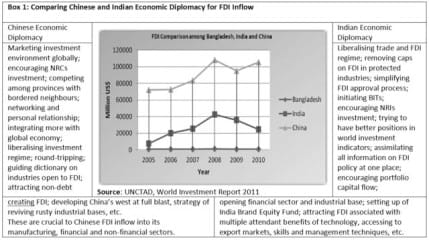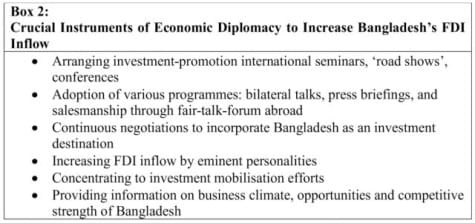FDI and economic diplomacy
 VARIOUS literatures show how economic diplomacy reduce barrier to and negotiate deals on investment at multiple levels. Not only is the meta-effect of economic diplomacy on investment inflow positive, but the cementing of a country's image and economic diplomacy for FDI is literally evident. The former identifies the role of economic diplomacy in making a country a more attractive destination to invest in. Needless to say, there is a link between economic diplomacy and FDI.
VARIOUS literatures show how economic diplomacy reduce barrier to and negotiate deals on investment at multiple levels. Not only is the meta-effect of economic diplomacy on investment inflow positive, but the cementing of a country's image and economic diplomacy for FDI is literally evident. The former identifies the role of economic diplomacy in making a country a more attractive destination to invest in. Needless to say, there is a link between economic diplomacy and FDI.
We are used to comparing economic policy or our gains with China and India; so, why not focus on economic diplomacy in regards to FDI? Both with a diverse set, and similar at times, as well of economic diplomacy (see Box 1) have by now been desired choices for global investment.
Whatever lesson Bangladesh learns from the economic diplomacy of China and India is a key to Bangladesh. 'Whether manufacturing or service sector are to be prioritised' are questions that can be looked into.
Economic diplomacy calls for an engagement with a shift in the global FDI composition. It demands encouraging FDI in priority areas where Bangladesh's gain for long is productive. FDI in manufacturing, both RMG and non-RMG, is to be prioritised; globally branded FDI firms in Bangladesh's RMG must be persuaded.
Economic diplomacy has to prioritise export-driven FDI in manufacturing. It has to focus on improving the quality of the FDI inflow. "Alternative Development Model" by Ambassador Milton Nathaniel Barnes pays attention to investment by non-resident citizens. NRBs must be encouraged to invest in Bangladesh.
It is crucial to carry on negotiation with three types of countries:
* Those that have already invested,
* Those that have recently shown interest to invest, and
* Those who are potential for Bangladesh.
 For the first group, economic diplomacy is to advance negotiations with them and keep them busy with their sectors invested.
For the first group, economic diplomacy is to advance negotiations with them and keep them busy with their sectors invested.
For the last two, undertaking supportive measures to attract them to invest in Bangladesh is crucial. Besides, four initiatives are important: strengthening economic diplomacy with the US, looking for ASEAN outward FDI, engaging with initial BRICs, and negotiating FDI from G-20.
Strengthening economic and commercial diplomacy to negotiate BITs with as many countries as possible is crucial. Existing BITs have to be economically reviewed. Regional, sub-regional and plurilateral cooperation are functional to tap investment complementarities.
At a multilateral level, Bangladesh's economic diplomacy has to be familiar with the multilateral FDI. GoB and its concerned agencies as well as non-public organs home and abroad must work together at multiple levels to increase FDI inflow to Bangladesh. NRBs, Bangladeshi ambassadors, business diplomats, representatives working at regional and global financial institutions, and media are important actors as well to attract Bangladesh as a destination for global FDI.
For Bangladesh, one of the fundamentals is to exercise the instruments of economic diplomacy to increase FDI inflow to the country. The most important instruments are concluding BITs, double taxation avoidance agreements, and FTAs. Building the foreign investors' confidence through consistent lobbying and regular high-level exchange visits at commercial levels is crucial.
Encouraging NRBs and liberalising policy for them are important. Vital is to liberalise rule governing FDI, capital market, and intensify global economic integration. Increasing role of Bangladesh embassies and becoming ambassadors the foremost salesmen of Bangladesh are highly crucial.
Also essential is to promote consular and commercial diplomacy. Bringing out booklets on success stories, increasing promotional activities in world media, marketing and branding of Bangladesh, and making scientific guidelines on how investors will be benefited are highly important.
Existing brand organisations, which have successfully invested in Bangladesh and gained, can be requested to showcase success stories from Bangladesh. Marketing campaign to redefine Bangladesh's image as an investment destination is important. Public diplomacy to actively publicise image of Bangladesh and to attract FDI is crucial. Other important instruments are shown in Box 2.
What China and India have done and what Bangladesh has to do in case of economic diplomacy is the big difference for the latter to attract itself as a destination to receive comparable amount of FDI inflow. For Bangladesh, it is crucial to have a focused FDI strategy: how much FDI Bangladesh could target within what time, from whom and in which sector? Where opportunity is more and where it is less i.e. assessing area-based opportunity and deploying economic diplomacy in line with that is vital.
Finally, it is vital to internationalise Bangladesh's local companies.
The writer is Research Fellow at the Bangladesh Institute of International and Strategic Studies (BIISS). E-mail: [email protected]

 For all latest news, follow The Daily Star's Google News channel.
For all latest news, follow The Daily Star's Google News channel. 



Comments